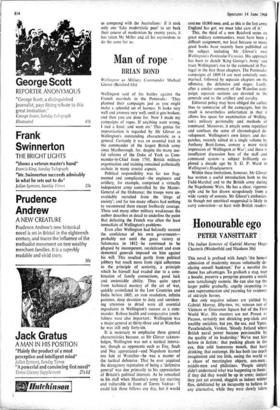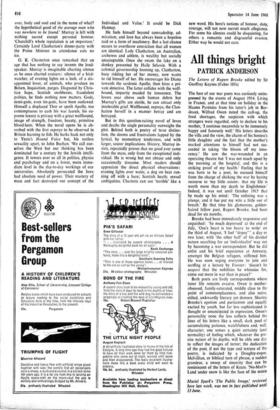Honourable ego
PETER VANSITTART
This novel is prefixed with Jung's 'An honest admission of modernity means voluntarily de- claring oneself bankrupt.' For a novelist the theme has advantages. To gralloch a stag, trap a boodle, preserve a peregrine presents a world now tantalisingly esoteric. He can also tap the larger public gradually, angrily suspecting its own superannuation and yearning for evidence of old-style heroes.
But only negative solaces are yielded by Gabriel Murray, fifty-two, vc, veteran not of Vietnam or Grosvenor Square but of the First World War. His mentors are not Proust or Picasso, certainly not shrieking pop-idols and wealthy socialists, but yes, the sea, and Ypres, Passchendaele, Verdun, 'bloody Jutland where British naval power became pensionable by the quality of its leadership.' We've met him before in fiction: that pucking gleam in the eye, thin cold humorous mouth, that hard drinking, that contempt. He has both too much imagination and too little, seeing the world as a chaos of meaningless objects, con-men middle-men and philistines. 'People simply didn't understand what was happening to them: if they did they would be up in arms; instead they just sat around, sluggish as indoor winter flies, debilitated by an incapacity to believe in any alternative, while they were slowly taken over, body and soul and in the name of what? the hypothetical good of the average man who was nowhere to be found.' Murray is left with nothing sacred except personal honour. 'Churchill's whole reputation is an imposture.' Certainly Lord Clanhatton's dinner-party with the Prime Minister in attendance cuts no ice.
G. K. Chesterton once remarked that an age that has nothing to say invents the loud- speaker. Murray is imaginable charting silence as he once charted cruisers : silence of a bird- watcher, of evening lights on a loch, of a dis- appointed lover, of animals, who produce no Belsen, Inquisition, purges. Disgusted by Chris- tian hope, Scottish snobberies, fraudulent politics, he finds nothing now matters. Gods, demi-gods, even tin-gods, have been outlawed. Himself a displaced Thor or spoilt Apollo, too contemptuous to cash his war laurels, his su- preme luxury is privacy with a great wolfhound, image of strength, freedom, beauty, primitive blood-lusts. When the novel opens he is ab- sorbed with the first ospreys to be observed in Britain learning to fish. He harks back not only to Yeats's Hound Voice but, his restless sexuality apart, to John Buchan. 'We call our- selves the West but our thinking has been dominated for a century by the Jewish intelli- gence. It towers over us all in politics, physics and psychology and on a lower, more imme- diate level in the day-to-day workings of our universities. Absolutely persecuted the Jews bad absolute need of power. Their mastery of mass and fact destroyed our concept of the Individual and Value.' It could be Dick Hannay.
He feels himself beyond comradeship, ad- miration; and love has always been a hopeless raid or a form of machinery. But a last chance occurs to overthrow conviction that all women are identical. Lady Clanhatton, an Australian, archeress and athlete, is wealthy but socially unacceptable. Once she swam the lake on a donkey presented by Haile Selassie. With a colonial governorship looming up, Clanhatton, busy ridding her of her money, now wants to rid himself of her. He encourages his Diana towards the sardonic Apollo, then hires a pri- vate detective. The latter collides with the wolf- hound, impurity mauled by innocence. The lovers soar above such human debris but Murray's gifts are sterile, he can attract only intolerable grief. Wolfhound, ospreys, the Clan- hatton herself in a manner betray and are betrayed.
But in this question-raising novel of loves and deaths the single personality outweighs the plot. Behind both is poetry of terse distinc- tion, the dooms and frustrations lapped by the lyrical, by momentary tenderness, and with larger, sourer implications. History, Murray in- sists, repeatedly proves that no good ever came from the mass, only from the exceptional indi- vidual. He is wrong but not obtuse and only occasionally tiresome. Most readers should appreciate the direct physical observations: evening lights over water, a dog on heat run- ning off with a hare; Scottish heath; sexual ambiguities. Charteris can use 'terrible' like a new word. His hero's notions of honour, duty, Courage, will not now recruit much allegiance. For some his silences could be disquieting, for others a romantic and disgraceful evasion. Either way he would not care.











































 Previous page
Previous page